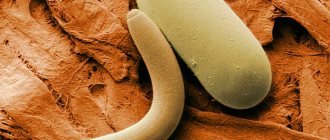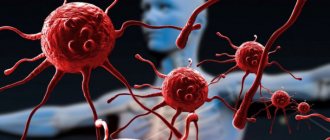Worms are a topic that is not usually discussed in polite society. Indeed, there is little pleasant in helminths, and many believe that becoming infected with them is a great shame.
In fact, every person in his life runs the risk of getting helminthiasis - this is the name of the disease in which the body is parasitized by worms, called helminths or simply worms.
Of course, helminthiasis must be treated. It is equally important to take preventive measures to prevent worm eggs from entering the body. In this article we will answer questions about how to do this.
Symptoms of helminthiasis: how to understand that there is a “stranger” inside you?
There are many signs of worm infection, and we will list the main ones. If you notice at least a few of the symptoms, you should consult a doctor:
- itching in the anus and genital area (typical of pinworm infection);
- urticaria - redness of the skin and rashes on it (allergic reaction to helminths);
- swelling of the mucous membranes (also observed due to exposure to allergens);
- abdominal pain, nausea, changes in appetite (increase or decrease), rapid weight loss;
- diarrhea, constipation, increased gas formation, other stool disorders;
- changes in blood composition;
- weakness, fatigue, dizziness;
- headache;
- enlarged lymph nodes, liver and spleen;
- pain in joints and muscles;
- blood in the urine, frequent urge to urinate;
- dry cough, shortness of breath;
- constantly elevated temperature.
However, there are cases when helminthiasis is asymptomatic for a long time. We recommend that you pay maximum attention to your health and make an appointment with a doctor for preventative measures. This is especially true after traveling to countries famous for unsanitary conditions.
Important diagnostics
Modern diagnostic methods make it possible to identify almost all types of parasites. However, cases of infection often remain unsolved. Usually patients do not even think that they could be attacked by worms. After all, weakness, depression, loss of appetite, headaches, allergic reactions can occur with a variety of diseases.
As a result, people are not given the necessary examination, and the true cause of the illness is not revealed. And the person continues to visit doctors and take useless medications.
Therefore, diagnosing parasitic infections is very important. Especially in cases where the diagnosis is not fully understood, treatment does not help the person well, and complaints remain.
Helminths: so what are they?
We call worms the simplest round or flat worms that parasitize the body of humans or animals. Experts identify more than 400 species of human worms, of which about 100 species have been found in Russia.
The most famous helminths are, of course, roundworms, pinworms and various types of tapeworms. However, even experts will not be able to list all existing types of worms. Moreover, in exotic countries you can become infected with helminths that are absolutely atypical for our region.
It is precisely because of the variety of worms that it is difficult to give the patient a correct diagnosis. Symptoms of helminthiasis can resemble manifestations of various diseases, depending on which particular parasite has entered the body.
In addition, a person can suffer from several types of helminths at the same time, which further complicates the clinical picture and has a detrimental effect on the patient’s condition.
Based on the places in which the worms are localized, they are divided into:
- cavity or luminal - living in different parts of the intestine (pinworms, whipworms, dwarf tapeworms, broad tapeworms);
- tissue - choosing body tissues as their habitat (muscles, lungs, heart, liver, skin, eyes, etc.).
The roundworms we all know can be classified as both types of helminths. Most often they live in the intestines, but sometimes roundworm eggs travel through the bloodstream to other organs of the body and develop there.
According to the World Health Organization, every second inhabitant of the Earth becomes infected with helminths every year without knowing it. Some Russian and foreign researchers come to the conclusion that certain parasites can be found in the bodies of 95% of people.
Types of parasites
There are a great many organisms that live off of us. Currently, more than 200 species of parasites have been identified in humans. Here are the most common ones.
Toxoplasma
Affects the nervous system, liver, spleen, skeletal muscles and myocardium. Most dangerous for pregnant women. If the expectant mother gets sick with toxoplasmosis, the child will most likely be born with deformities.
Amoeba
Most often it causes damage to the colon with prolonged diarrhea. According to WHO, 10% of the world's population suffers from amebiasis.
Alveococcus
Grows into the tissue of the host organ, like a malignant tumor. The liver and brain are often affected, where the size of the formation caused by the parasite can reach 15 cm in diameter.
Schistosoma
Lives and multiplies in the blood of a sick person. Can pass through the walls of blood vessels, entering the bladder and intestines. The embryos located inside the eggs secrete a specific poison that destroys tissue and poisons the body.
Pinworms
Most often found in children, they inhabit the lower parts of the small intestine and part of the large intestine. If pinworms clog the appendix, it can cause an attack of appendicitis. Digestion and absorption of food are disrupted, and the level of important microelements in the blood of patients is significantly reduced.
Roundworms
Ascaris larvae in the human body can lead to serious disruptions in the functioning of the immune system. At an early stage of the disease, there may be an increase in body temperature, a dry cough, a rash, and sometimes an enlarged liver. Having settled in the intestines, roundworms secrete poisons that are strong allergens.
Ways of helminths entering the body
There are several of them, but the most common ways are four:
- From person or animal to person. This is how, for example, pinworm infection occurs. If a person infected with this type of worms touches various objects without washing their hands, then this will become a risk factor for others (it is not without reason that enterobiasis - and this is what pinworm infection is called - is an occupational disease of teachers, because pinworms are a real scourge of primary schoolchildren) .
- Through the soil. Worm eggs enter it along with human and animal feces, after which they are carried by water, insects, pets or wind (with dust particles) and end up on food or directly into the digestive tract or respiratory tract.
- When eating food that has not been subjected to heat treatment. Raw or half-raw meat or fish infected with worms are very dangerous. Therefore, you should very carefully choose restaurants that serve sushi.
- For insect bites. This happens quite rarely, but the risk of contracting helminthiasis through a bite increases when traveling to exotic countries.
Consequences of untreated parasitic infestations
Helminthiasis poses a serious danger; without treatment, it can result in death or significant health problems. An infected child poses a danger to the entire family and environment, as it spreads the disease.
Complications of worms in children:
- inflammatory exacerbation of appendicitis;
- epileptic seizures;
- visual impairment of several types;
- allergic reactions with copious nasal discharge;
- developmental lag behind peers;
- sexually transmitted infections, the most common in girls is vulvovaginitis;
- various types of pulmonary manifestations, including bronchial asthma;
- in difficult cases - damage to the brain and heart.
Helminthiasis - a childhood disease?
Worms are often considered a childhood disease. The reason for this is that children often do not follow the simplest hygiene requirements: they do not wash their hands when coming from the street, after visiting the toilet or petting an animal, they eat dirty fruits and vegetables, and they may drink unboiled water. Kids, in addition, get to know the world by testing it by taste - they, as you know, put everything they can reach into their mouths. This is how parasite eggs enter the body.
The facts today are as follows: yes, children suffer from helminthiasis more often than adults. But this does not mean that advanced age is insurance against the penetration of worms into the body.
General information
Helminthiasis is a common problem among certain categories of the population. Children, as a rule, are parasitized by pinworms , people who often consume fish are diagnosed with diphyllobothriasis trichinosis is common among hunters .
The fact that human worms provoke the development of many diseases that would seem to have nothing to do with helminthiasis is currently confirmed by a wide variety of studies. In particular, there is a theory that helminthic diseases are associated with the development of oncological processes.
In addition, you should be aware that if there are helminths in the body, this does not mean that the patient will exhibit symptoms of such infection. Signs of their presence can be disguised as other ailments of the liver, gallbladder, and gastrointestinal tract. As a result, a person can use different means for a long time and not detect infection. And after the correct anthelmintic treatment regimen has been selected for the patient, the disease can be cured. Therefore, asking yourself the questions: “What should I do if I have helminths, how can I check for the presence of parasites, and will I infect my loved ones?”, you should not be afraid to consult a doctor and get all the answers, and also find out what to do if you have you are wormed.
Read the article below for answers to questions about what worms are, how dangerous such parasites are, and how to avoid becoming infected with different types of parasites. We will also talk about what are the signs of worm infection, both general and specific.
How dangerous are worms?
A reasonable question: if the worms will most likely disappear on their own after some time, is it worth treating them? Doctors answer: this step is necessary.
Some types of worms have a very long lifespan and during this time they will have time to harm our health. But even parasites such as pinworms, which die after about a month, are harmful to the body.
Possible consequences of infection:
- The waste products of worms act on the human body as poisons or allergens, reducing overall well-being. An allergic reaction, in turn, can lead to Quincke's edema and death.
- Living in human tissues and organs, helminths damage them mechanically and interfere with normal functioning.
- Worm larvae, migrating throughout the body in the bloodstream or entering the respiratory tract, can clog blood vessels and cause bronchial obstruction.
- Some types of helminths disrupt the digestive process, which can lead to severe poisoning.
- Experts have discovered that there are helminths that cause cancer.
Worms are the most dangerous for children: in addition to a huge range of diseases and decreased immunity, they can cause developmental delays, both physical and mental.
Symptoms
There are a lot of symptoms, and individual manifestations depend on which helminth eggs have entered the body. Next, we will talk about the general symptoms for all parasitic infections, and then about enterobiasis, ascariasis and 5 other types of infections.
General symptoms:
- increased irritability, restless sleep, decreased perseverance and attentiveness, frequent hysterics and anger;
- increased appetite associated with active weight loss;
- symptoms from the digestive system - diarrhea, constipation, nausea, pain in the right hypochondrium;
- dizziness and headache;
- food allergies;
- nasal discharge;
- diseases and infections of the reproductive system;
- brittle nails/hair;
Enterobiasis is a helminthiasis in which the body is infected by pinworms. The larvae emerge from the eggs within 4-6 hours; in 2-4 weeks they become adults - grayish or white roundworms 5-10 mm long. They settle in the cecum and appendix, and lay eggs outside the anus - at night, female pinworms come out into the air for this purpose. This reproduction mechanism leads to severe itching at night - hence restless sleep, tossing and turning, and screaming.
Additional special symptoms:
- night urination;
- grinding teeth;
Ascariasis is a helminthiasis in which the body is colonized by roundworms. These worms are already larger - the average length of an adult is 25-30 cm. The larvae and eggs enter the body with insufficiently disinfected fresh fruits and vegetables. The development period takes place in the intestines, after which they pass into the lymphatic and blood vessels, and with the flow of blood and lymph they are distributed throughout the body - in the liver, heart, lungs. They then enter the oral cavity and are re-swallowed. From this moment, adult roundworms begin to develop. This takes approximately 3 months.
How to suspect the presence of worms in children:
- the liver, spleen, lymph nodes enlarge;
- the temperature rises, sometimes up to 38 degrees;
- malaise and weakness appear;
- respiratory pathologies develop - pneumonia, bronchitis and bronchial asthma;
- pressure drops;
- Gastrointestinal symptoms appear - constipation, diarrhea, nausea and vomiting, pain in the form of contractions;
- fear of light;
- nightmares at night;
- dry cough - sputum with an orange tint and bloody spots.
It is more difficult to breed roundworms than pinworms, since the female lays almost 250 thousand eggs every day. In no case should you rely on traditional methods or buy the first remedy you come across at the pharmacy - be sure to contact a specialist.
These are not all worms in children that inhabit the body. There are more than 300 species of helminths in the world, and 70 of them are found in Russia alone. In addition to the two listed types, 5 more types are becoming widespread:
- trichocephalosis - characterized by a lag in both physical and intellectual development, but in general it is almost asymptomatic;
- opisthorchiasis – the temperature rises, the nodes of the lymphatic system enlarge, skin rashes appear;
- hymenolepiasis – the main consequence is rhinitis;
- toxocariasis - has many symptoms that distinguish it from other helminth infections: keratitis, cough with suffocation, ophthalmitis, chorioretinitis, facial swelling;
- wide tapeworm - characterized by anemia, intestinal disorders, pain in the abdominal area.
Infants may experience symptoms after just a few weeks of life if they have received the eggs and larvae of worms from their mother, for example during childbirth. As a rule, symptoms manifest themselves in the form of lack of weight gain, excessive drooling, rash, pallor, blue under the eyes, constipation. The child is constantly worried, screams, sleeps and eats poorly. The screaming can be unbearable and the baby will turn blue in the process.
Worms are often the cause of the development of pulmonary pathologies and are diagnosed using ultrasound or x-ray. Parasites, in particular Echinococcus tapeworm, can damage not only the respiratory system, but also move further to the brain and heart. In areas where helminths develop in the lungs, scars and adhesions appear, and the shape of the lungs begins to change. Such changes provoke a wide range of diseases - asthma, fibrosis, bronchitis, pleurisy, emphysema, etc. When a tapeworm enters the lungs, echinococcosis is formed, when the parasite develops in the form of a cyst.
Symptoms will largely depend on which helminth has entered the body, but the child’s anxiety and the presence of the above general symptoms should alert parents. If signs of worms appear, make an appointment with a pediatrician or gastroenterologist to get tested in a timely manner.
Treatment of helminthiasis
Having determined the presence of parasites in the body, the doctor develops a course of treatment based on which worms have “settled” in the person, and prescribes the necessary medications.
Some people believe that you can use “grandmother’s remedies” (for example, eating garlic) and thereby get rid of “uninvited guests”. But, as we have already said, helminths are diverse, and only a doctor, after conducting all the necessary research, can confidently conclude what type of helminthiasis the patient suffers from and how it should be treated.
SMC Best Clinic has everything you need to conduct laboratory tests, and our doctors have extensive knowledge about helminths and the treatment of helminthiasis. You can safely entrust your health to us.
Make an appointment
The clinic offers the services of an experienced gastroenterologist, candidate or doctor of medical sciences, who will make a preliminary diagnosis, prescribe only the necessary studies according to the results of the examination, and write out a treatment plan. Having our own laboratory allows us to quickly obtain tests, and the absence of queues and appointments by appointment allows us to prescribe treatment as soon as possible. To make an appointment, select the doctor you like and fill out the form on the website, use the general appointment form, the function to order a call back, or simply call our contact center.
Preventive measures against worms
In order not to become infected with helminths, you need to remember about hygiene: always wash your hands, vegetables and fruits, get rid of the habit of wetting your fingers with saliva when turning pages, and generally putting your hands to your mouth, do not try foods in markets, eat with caution in unfamiliar restaurants and regularly take shower.
These measures, however, do not guarantee complete protection against worms - this should not be forgotten. Therefore, get tested at least once a year and be sure that there are no “dangerous residents” in your body.
Signs of infection depending on the type
Photo of worms in humans
How worms manifest themselves and why they are dangerous depends on the type of parasite, where exactly in the body they live, and also on the intensity of infection. Signs of infestation in humans can be detected within a few days. For example, if roundworms appear, then health deteriorates within 2-3 days. When infected with other types of helminths, the first signs are observed in the patient after 2-3 weeks. The incubation period of filariasis ranges from 6 to 18 months.
Intestinal worms are dangerous from the point of view that if there is a single individual in the intestines, then it is impossible to understand that a person is infected, since there are no signs. Certain symptoms may only bother you if the worms are long (ascaris, wide tapeworm, etc.), or if a massive infection has occurred. Almost all helminthiasis causes headache, fatigue, dizziness , and irritability.
What types of worms are there, what are they called and what do they look like?
Photo of worm eggs
- Pinworms (enterobiasis) - the presence of this type of helminth can be determined by the manifestation of the main symptoms, as well as by the manifestation of itching in the anus, which becomes more intense at night. If there are only a small number of pinworms in the body, the itching may occur for a few days, then go away and appear again after a few weeks. With severe infestation, itching may be felt constantly.
- Roundworms - what are the signs of ascariasis depends on the phase of development of these parasites. In the phase when the larvae migrate to the heart, lungs and other organs, there is weakness, low-grade fever, and a cough that produces sputum, sometimes with pus and blood. If you take an X-ray of the lungs at this time, it will show volatile infiltrates, which later disappear. Allergic reactions develop, a blood test demonstrates a large percentage of eosinophils . If the infestation is severe, the development of bronchitis , pneumonia, and asthma attacks is likely. People often wonder if there can be a cough when infected? Indeed, it is possible. You may also experience a sore throat . Signs of the second phase are associated with digestive disorders. Roundworms produce substances that neutralize pepsin and trypsin, human digestive enzymes . As a result, proteins are not digested, and the patient loses a lot of weight. Ascariasis sometimes causes complications - pancreatitis , obstructive jaundice, intestinal obstruction , appendicitis .
- Ankylostomiasis , schistosomiasis , diphyllobothriasis , trichocephalosis - with such lesions anemia and vitamin deficiencies develop. After all, the toxins that helminths of these varieties secrete significantly worsen microflora , provoking the development of dysbacteriosis .
- Opisthorchiasis , fascioliasis , clonorchiasis are liver parasites. The consequences of invasion are icteric syndrome, enlarged liver, spleen, pancreatitis, cholecystocholangitis, neurological disorders, pathologies of the digestive system.
- Trichinosis - with such a lesion, the most common symptoms are muscle pain, swelling of the eyelids, swelling of the face, fever .
- Strongyloidiasis is caused by roundworms, the symptoms are very varied. Signs of dyspepsia, allergies, biliary tract dysfunction, etc. may appear.
- Urogenital schistosomiasis is caused by flatworms and manifests itself as diuretic disorders. At the end of urination, blood is found in the urine. In men, it can lead to pathological lesions of the prostate and pathology of the seminal vesicles. In women it causes consequences in the form of vaginal bleeding and genital lesions. Fibrosis may appear in the bladder.
- Cestodosis is caused by tapeworms. These are bovine tapeworm , sheep brainworm, echinococcus, tapeworm, etc. Signs of the disease are severe weight loss, weakness, and gastrointestinal dysfunction.
Worms in the eyes
Helminths in the eyes are rarely found. Parasites are mainly found in the eyes of residents of humid and hot countries. “Eye” parasites are pork tapeworm, roundworms, and opisthorchis. Sometimes parasites enter the eyes from the external environment, sometimes from the intestines. In this case, it is important to immediately consult a doctor and find out how to treat the disease. To avoid infection, it is important to maintain facial hygiene, as well as general rules for disease prevention.
Cause of pinworm infection
Pinworm infection in humans occurs for the following reasons:
- poor sanitary and hygienic conditions;
- failure to comply with hygiene rules;
- pinworms in family members.
The only source of pinworm infection is humans. The infection spreads very easily through the mouth, for example through contaminated hands or food. This problem especially affects children, who often do not follow basic hygiene rules and put various objects, toys or school supplies, such as pens and pencils, in their mouths, which facilitates the penetration of pinworms into the body.
Pinworm infection through contaminated hands
This is why it is so important that adults teach children basic hand hygiene rules and set an example of proper behavior themselves.
Symptoms of pinworms
Among the symptoms of pinworms that may indicate an infection, the most common is persistent itching around the anus.
Patients are often irritable and have trouble concentrating. They often complain of abdominal pain and headaches. Teeth grinding is also a characteristic symptom that many parents pay attention to.
Pinworms may also be accompanied by:
- loss of appetite;
- weight loss;
- pale skin;
- dark circles under the eyes.
Dark circles under the eyes
Weight loss
It is worth noting that women may experience itching around the vagina. Pinworms can penetrate the female genitals and cause inflammation. There are also known cases of appendicitis caused by pinworms. In adults, the symptoms of pinworms are not very different from those in children. However, they are often much less serious.
Complications (helminthic infestation)
It is important for parents to both understand in a timely manner that their child has symptoms of worms and to carefully follow all the doctor’s recommendations. Only in this case can unpleasant and even life-threatening complications be avoided:
- intestinal obstruction;
- jaundice caused by blockage of the bile ducts;
- pancreatitis;
- pustular skin lesions;
- appendicitis;
- acute pulmonary failure;
- eye damage, accompanied by decreased visual acuity and development of strabismus;
- damage to the intestinal wall, peritonitis;
- encephalitis, megingoencephalitis, etc.
Molecular Biology Research
In more complex diagnostic cases, genetic tests from the field of molecular biology can be performed. Indications for such tests:
- suspicion of low intensity infection (cannot be detected using basic tests);
- localization of the parasite;
- difficult to reach organically (sampling may be an invasive procedure);
- difficulties in differentiating species and the need to determine drug sensitivity.
These tests also complement imaging tests (ultrasound) and negative stool microscopic examination results. The material may be blood, feces, or other tissue from the injured person.
Molecular studies use the following methods: PCR (polymerase chain reaction), real-time PCR, nested PCR, loop isothermal amplification method (LAMP) and fluorescence in situ hybridization (FISH).
How to get rid of worms in humans?
When infection occurs, the pressing question is how to get rid of parasites in children and adults.
Currently, treatment of worms in humans is carried out using modern drugs. Treatment of helminths in an adult is carried out using more than ten drugs that are active against different types of worms. There are broad-spectrum and narrow-spectrum medications. Since a person can be infected with different types of helminths (in total, more than 70 species parasitize them in our regions), it is important to choose the right specific drug. Therefore, the decision on how to treat and how to treat helminthiasis should be made only by a specialist after testing. To get a detailed consultation, you should contact a parasitologist. However, if a patient goes to a small clinic or outpatient clinic, you can find out which doctor treats this disease directly at the medical institution.
It is important to note that medications for worms are very toxic. Therefore, only a doctor can identify symptoms and prescribe treatment for helminths in a person, having established a diagnosis. In the process of prescribing medications, a person’s weight and age are taken into account. Also, when infected with different helminths, different treatment regimens are required.
Therefore, those who are interested in how to recover from infection should definitely consult a doctor and not practice exclusively treatment with folk remedies.
There is a lot of advice on how to remove worms from a person at home, but a guaranteed method of getting rid of parasites is drug treatment.
The answer to the question whether helminths can exit through the mouth is positive. But they vomit only after taking certain medications.
Drugs used to treat helminthiasis
| Active substance | Drugs | Action |
| Piperazine | Piperazine | Worms in the stomach are subject to paralysis, since under the influence of the drug the flow of nerve impulses to the muscles is disrupted. Excreted in feces. |
| Pirantel | Pyrantel , Helmintox , Combantrin, Nemotsid | They cause neuromuscular blockade in worms, they quickly die. They come out with feces. |
| Mebendazole | Vermakar , Vermox , Vero-Mebendazole, Mebex, Vormin, Thermox | Under the influence of the tablets, the processes of cellular globulin synthesis are suspended. As a result, paralysis occurs and the worms die. |
| Albendazole | Gelmodol-VM, Nemozol, Vormil | They paralyze worms and also disrupt their metabolism at the cellular level. Excreted in feces or vomit and may be digested or unchanged. |
| Karbendatsim | Medamin | Paralyzes the muscles of helminths. It comes out in the feces. |
| Levamisole | Dekaris | Affects metabolism worm cells. They experience paralysis, after which 24 hours after taking the drug, the helminths are excreted in the feces. They don't come out vomiting. |
| Pyrvinium embonate | Pirkon, Vanquin, Pyrivinium | Effective against enterobiasis, they block the enzyme systems of helminths, thereby disrupting the transport and metabolism of glucose. |
How do worms come out from a person after treatment? They are excreted in feces and vomit, remaining unchanged and in a state of paralysis.
Helmids can also be released in vomit or feces in the form of fragments. If the patient has very active intestinal motility, intensive digestion of food and, accordingly, helminths occurs, which are then eliminated in the form of particles.
Regardless of how the worms come out, it is important that particles or whole worms are visible. However, sometimes no worms are found in the stool after taking medications. This may indicate that the body has digested the dead helminths inside.
However, if the parasites cannot be removed, this may be an indication that the dose of the medicine was chosen incorrectly, or the drug was chosen incorrectly.
However, if the tablets were taken for preventive purposes, then, of course, they will not fall out, since there are no helminths in the body.
Since some medications do not act on the larvae and eggs of worms, in order to completely drive away the parasites, you need to repeat the treatment after 2-3 weeks. If the treatment was carried out correctly and infection does not occur, then getting rid of the parasites is sure to occur.
In addition to “scientific” treatment, there are also folk remedies, the use of which is relevant for those who are interested in how to get rid of parasites, in particular, to get rid of tapeworm. We are talking about the use of pumpkin seeds and tansy grass, which have long been used to “poison” parasites. Those who have already been interested in how to get rid of parasites in the human body know that pumpkin seeds are a good remedy for removing parasites from the body. To rid yourself of helminths, it is better to eat raw seeds with a thin film between the peel and the seed. There is the following recipe for those who treat helminth infections: 300 g of pumpkin seeds, crushed and mixed with honey, should be eaten within an hour in the morning. After this, you can’t eat anything for 3-4 hours. Next you need to do an enema. Reviews indicate that such a medicine can be effective. There is also evidence that ginger, garlic, etc. help drive out worms.
The fact that the fight against worms was successful is evidenced by an improvement in the general state of human health. It is very important not to hope that the infection will go away on its own, because the answer to the question “Can the worms themselves go away?” ambiguous. After all, even if a person’s white worms or other types of helminths die, then the likelihood of the one who was infected will “catch” the parasites again is very high. Therefore, it is necessary to fight helminths systematically and correctly. And after taking the pills, be sure to get checked: a check in the form of tests is needed to thoroughly check the condition of the body and make sure that all helminths have been removed.
If the body is parasitized by subcutaneous worms, then tablets are not relevant in this case. If a parasite grows under the skin, surgical treatment is practiced: the skin is cut open and they come out. Why is it important to see a doctor on time? To avoid unwanted complications, especially in the elderly and children.
Causes of helminthic infestations
The cause of the pathology is a parasitic worm. Each type of disease has a specific type of pathogen. The most common are pinworms. They cause enterobiasis. Pinworms are small worms that are no more than one centimeter long. The color of this pathogen can be either white or almost black.
The life cycle of a female pinworm is 1.5 months. At the same time, they lay eggs in the folds of skin around the anus, after which they die. Pinworms are most often activated at night.
An equally common pathology is ascariasis. In this case, the cause of the disease is roundworms more than twenty centimeters long. This type of pathogen multiplies in the small intestine, which makes diagnosis difficult, since it is practically impossible to detect either adults or larvae in the feces. Roundworms have a lifespan of several years.
Most often, infection occurs due to poor hygiene. The larvae of the pathogen from the soil fall on vegetables, berries and fruits. In addition, infection can occur by ingesting water in open bodies of water. Children often become infected with helminthic infestations from pets through dirty hands.
Description of the disease
Helminthic infestation or helminthiasis (damage to the body by worms) is a widespread phenomenon in childhood. Few children have not suffered from helminthiasis at least once in their life. Manifestations of the disease, as a rule, are known to everyone: the child suffers from itching in the anus (intensified at night), stomach upset, loss of appetite, and a feeling of fatigue.
While in the intestines, the worms feed at the expense of the host’s body, affecting internal organs and systems. Currently, more than 300 varieties of worms are known. The most common in childhood are pinworms and roundworms.
Helminthic infestation requires immediate treatment by a qualified gastroenterologist. While in the child’s body, worms disrupt the process of absorption of nutrients, their waste products have a negative effect on the gastrointestinal tract, and, if left untreated, can affect other vital organs - the lungs, brain, etc.
How to get tested for worms
If it is necessary to conduct research, the doctor will prescribe a test for helminth eggs in the feces. To do this, you need to pass feces three times. A blood test for worms is also prescribed in adults, and the same analysis is carried out in children. It is also necessary to donate blood for Giardia . The patient is also prescribed a scraping for enterobiasis , which must be done three times.
Testing for eggs in human stool involves examining the stool under a microscope. Such a study makes it possible to diagnose ascariasis, trichuriasis, hookworm infection, enterobiasis, etc.
It should be taken into account when taking tests for helminth eggs that this is a test for which you need to prepare in advance. Thus, 72 hours before the analysis you should:
- exclude the administration of rectal medications, the use of laxatives ;
- limit the use of medications that affect the color of stool and intestinal motility.
The disease is excluded if no worm eggs are found in the samples. If worms are found in the stool, a count is made of how many there are in the stool.








